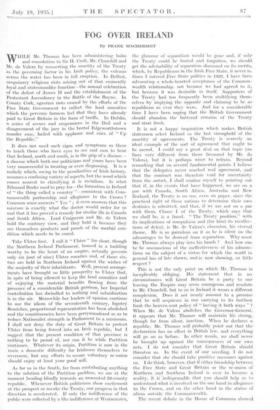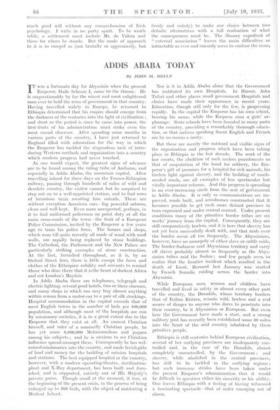FOG OVER IRELAND
By FRANK MACDERMOT
WHILE Mr. Thomas has been administering balm and consolation to Sir H. Craft, Mr. Churchill and Mr. de Valera by reasserting the sanctity of the Treaty as the governing factor in his Irish policy, the volcano across the water has been in full eruption. In Belfast, sanguinary religious riots arising out of that eminently loyal and statesmanlike function—the annual celebration of the defeat of James II and the establishment of the Protestant Ascendancy in the Battle of the Boyne. In County Cork, agrarian riots caused: by the efforts of the Free State Government to collect • the land annuities which the perverse farmers feel that they have already paid to Great Britain in the form of tariffs. In Dublin, a. .series of scenes and suspensions in the .Dail and a disagreement of the jury in the brutal Edgeworthstown murder . case, hailed with applause and .cries of " Up the Republic."
It does not need such signs and symptoms as these to teach those who have eyes to see and ears to hear that Ireland, north and south, is in the grip of a disease— a disease which both our politicians and yours have been very unsuccessful in treating or even diagnosing. It is a malady which, owing to the peculiarities of Irish history, assumes a confusing variety of aspects, but the word which comes nearest to classifying it is racialism. Is what Edmund Burke used to pray for—the formation in Ireland of "the thing called a country "—consistent with Com- monwealth partnership and allegiance to the Crown ? Common sense answers " Yes " ; it even answers that this mixture is exactly what the doctor would order for us and that it has proved a remedy for similar ills in Canada and South Africa, Lord Craigavon and Mr. de Valera hold the contrary view, and they hold it because they are themselves products' and proofs of the morbid con- dition which needs to be cured.
• Take Ulster first. I call it " Ulster" for short, though the Northern Ireland Parliament, housed in a building worthy to be the heart of an empire, actually governs only six , (out of nine) Ulster counties and, of those six, two are held in Northern Ireland against the wishes of the majority of their inhabitants. Well, present arrange- ments have brought so little prosperity to Ulster that, in spite of being allowed to keep the land annuities and of enjoying the material benefits flowing from the presence of a considerable British garrison, her Imperial Contribution' has dwindled to nothing and subsidization, is in the air. Meanwhile her leaders of opinion continue to use the idiom of the seventeenth . century, bigotry flourishes, proportional representation has been abolished and the constituencies have been gerrymandered so as to reduce Nationalist strength in Parliament to a minimum.
shall not deny . the duty of Great Britain to protect Ulster from being forced into an Irish republic, but I suggest that the present condition of that province is nothing to be proud of, nor can it be while Partition Continues., Whatever its origin, Partition is now in the main a domestic difficulty for 'Irishmen themselves to overcome, but any efforts to secure voluntary re-union should enjoy at least your good will. • • . As for us in the South, far from contributing anything to the solution of the Partition problem, we are at the moment heading blindly towards an unwanted 26-county republic. Whenever British politicians show excitement at the prospect or invoke the Treaty, our progress in that direction is Accelerated. If only the indifference of the public were reflected by a like indifference at Westminster, the glamour of separatism would be gone and, if' only the Treaty. could ,bc buried and forgotten, we should get the advisability -of separation discussed. on its merits, which, by Republicans in the Irish Free State, it never is Since I entered Free State politics in 1932, I have been advocating a whole-hearted acceptance of the Common- wealth relationship, not because we had agreed to it, but because it was desirable in itself. Supporters of the Treaty had. too frequently been stultifying them- selves-by' implying the opposite and claiming to be as republican As ever they were. And for a considerable time I have been urging that the British -Government should abandon the battered remains of the Treaty and start. fresh. • It is. not a happy inspiration which makes British Statesmen select Ireland as the last Stronghold of the sanctity of agreements, The Treaty is scarcely An ideal example of the sort of agreement that ought to be sacred. I could say a great. deal on that topic on lines very different from those favoured by Mr. de Valera), but it is perhaps wiser to refrain. Beyond remarking that on several fundamental points I believe that the delegates never reached real agreement, and that the contract was therefore void for uncertainty from the outset, shall confine myself to pointing out that. if, in the events that have happened, we are on a par with Canada, South Africa, Australia and New Zealand, the Treaty is no use, even on paper, since the practical right of these nations to determine their own destinies is admitted, and that, if we are not on a. par with them, Clause I of the Treaty, which says that we shall be, is a fraud. " The Treaty position," with its implications of compulsion and (for him) its recollec- tions 'of defeat, is Mr. de Valera's obsession, his eternal theme. He is as garrulous on it as he is silent on the advantages to be derived from separation. Why must Mr. Thomai always phvy into his hands ? And how can he be unconscious of the ineffectiveness of his admoni- tions on the subject of' a virtue for which the world in general has Of late shown, and is now showing, so little respect ?
This is not the only point on which Mr. Thomas is inexplicably obliging. His statement that in no circumstances will Great Britain be a party to our leaving the Empire may seem courageous and resolute to Mr. Churchill, btit to us in Ireland, it wears a different complexion. Does it ,nOt nearly amount to a promise that he will acquiesce in our carrying to its furtheat limit the heaven-sent policy of " having it both ways " ? When Mr. de Valera abolishes the Governor-General, it appears that Mr. Thomas will Maintain his strong,' though far from silent, inaction. When he declares a iepublic, Mr. Thomas Will probably point out that the declaration has no effect in British law, mid everything will go on as before. In other words, we shall never be brought 'Up against the consequences , of our own Acts. I do not consider that Great Britain should. threaten us. In the event of our seceding, I do not Consider that she should take punitive measures against us. I do think, however, that if either friendship between the Free State and Great Britain or the re-union of Northern and Southern Ireland is ever to become a reality, it iCindispensable that you should help us to understand what is involved on the one hand in allegiance to the Crown, and on the other hand in the status of aliens outside the Commonwealth.
The recent debate in the House of Commons showed much good will without any comprehension of Irish psychology. I Write in no party spirit. To be W...ovtli while, a settlement must include Mr. de Valera and those for whom he stands. But the mode of approach to it is to compel us (not brutally or aggressively, but firmly and calmly) to make our choice between two definite alternatives with a: full realization of what the consequences must be. The illusory expedient of external association" leaves the main difficulties as intractable as ever and can only serve to confuse the issuei



























































 Previous page
Previous page